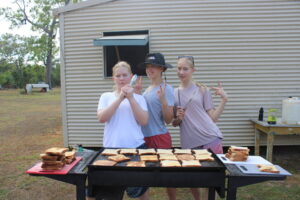Cape York 2024 Student Immersion
This week we feature the reflections of four students who travelled to Cape York in October 2024. In sharing their reflections, their commitment to Reconciliation and learning about Aboriginal culture, on the immersion is clear. The Traditional Owners of the lands we visited generously shared valuable knowledge about the use of their traditional land and waters. We have been publishing the reflections weekly since returning last year, and we hope the students’ words inspire thoughtfulness and gratitude for the many Indigenous peoples who are the holders of unique languages, knowledge systems and beliefs.
For the previous week’s reflections see here.
Cape York Reflection Kalkajaka & Panamuunji
Stella Grocott
The Indigenous Immersion at Cape York was a beautiful and unforgettable experience that I will remember forever. The trip created countless memories through humour and connection, as well as learning experiences, that I will always hold close to my heart. I was part of the Red Group, who visited the two homelands Kalkajaka and Panamuunji for nine days. Through this experience, I formed a new understanding of the culture and ways of life Indigenous Australians have been practicing for thousands of years.
The first homeland my group and I visited was Kalkajaka, where the Traditional Owner Ian greeted us onto his land with a verbal Welcome to Country. This sacred practice was performed to protect us on Country and give us permission to enter his home. Ian was very kind and welcoming, immediately providing a sense of humour as well as being open to sharing stories about the land. Black Mountain was a highlight of the immersion, where we watched the sun rise over the towering granite landscape as Ian informed us on the native species and passed on sacred beliefs of that area. We also gained knowledge from the Cooktown Museum. Ian also taught us traditional methods of fishing, as well as leading us on a hike up to a lighthouse with a stunning view of the ocean and a sacred island Ian pointed out to us.
Our second homeland, Panamuunji, is home to the Traditional Owners Tim and Elaine. When we arrived on Country, Tim performed a Smoking Ceremony to welcome us to his land, differing from Ian’s more casual verbal welcome, but equally as important. A moment from Panamuunji that I will always remember was swimming in the creek with the group and Tim, where he passed on knowledge and stories about his generational connection to the area, as well as teaching us about the different plants exclusive to the creek. This included showing us how to find special clay to exfoliate with and telling us about a flower that you could boil and drink for hair growth. Learning traditional methods of self-care was very different to what many of us were used to and interesting to learn about. Another key part of Panamuunji was working on projects around Tim and Elaine’s homeland, such as making flowerbeds and building pipe systems for flushing toilets. These challenges proved not only rewarding for us, but also for future groups, and helpful to Tim and Elaine.
When I first arrived on Country, I wondered how living in such a remote area provided enough resources and comfort. However, as I learnt new practices and values from the Traditional Owners, I began to understand the complexity of Indigenous culture and their remarkable way of living sustainably off the land. As the immersion progressed, I learnt that their respectful approach to nature has ensured the survival of their culture for thousands of years, and their quiet, rural lifestyle brings a sense of peace and calmness unattainable when living in the city. Throughout the journey, I realised the importance of not taking the resources I was used to having access to for granted. By the end of the trip, I noticed that the things I once relied on every day were no longer as important to me, like my phone, and I put more value in the privilege of security, privacy, and connection with my family and friends. The Traditional Owners Ian, Tim, and Elaine taught me morals that are now integrated into my identity and will stay with me forever. The Traditional Owners have had a lasting impact on me as they not only taught me new ways of life, but changed my perspective on the value of belonging, respect, and connection that has taught me important lessons like how to live in the moment.
Having the opportunity to travel to Kalkajaka and Panamuunji, two remote Indigenous homelands in Queensland, was a unique experience that would not have been possible without the immersion. After we visited the homelands, we spent a day on a boat trip in the Great Barrier Reef, where we snorkelled and learnt about the marine life of the area. The experience has provided me with lifelong memories and valuable insight into the true meaning and importance of sustainably protecting and preserving Reconciliation and Country.
Mabel Maclennan (Year 10)
In the October holidays last year, me and 40 other girls had the once in a lifetime opportunity to travel to Cape York and live on Indigenous homelands for 7 days. Whilst the journey was filled with countless fun moments and exciting activities, our time on the homelands and with the Traditional Owners has taught me so much and is something I’ll never forget. The trip opened my eyes to a much deeper understanding and appreciation for Indigenous culture. The memories and friendships I’ve made and the knowledge I’ve gained is something I will cherish forever.
Going into the trip I was very excited yet quite nervous. Whilst I had heard only amazing stories and reflections from girls who had previously gone on the trip, I was still worried. However, by the morning of the second day it all went away, and I was completely excited and enjoying it.
Some of my most favourite and memorable moments from the trip came from the connections we built and the unique experiences we shared. Sitting around the campfire with Uncle Bernie and Aunty Cheryl at the Wurrey Homeland and just listening to their stories and wisdom was incredible. Hearing about their connection to Country and ancestors was truly amazing. Trying green ants on our nature walk with Uncle Bernie was also a highlight. They were sour and surprisingly tasty. Fishing at the creek at Melsonby was another highlight, even with the unfortunate incident where I accidentally hooked Meike instead of a fish, thankfully she was okay. Finally, one of the last memories from the trip was talking to Denta at the campfire after dinner. She shared with us personal stories and challenges in her life as well as taught us about her culture such as her own totem and how that works. These memories are only a few of the endless we made on the journey, and I’ll treasure them forever.
Since returning home, I can see the affect the trip has on my everyday life. Through the teachings of the Traditional Owners, I’ve gained a deeper understanding of their rich culture, enduring struggles, and the strength of their connection to the land. Beyond this, they taught and truly instilled invaluable life lessons—appreciating what we have, living in the moment, and striving to always do the right thing. Their wisdom and resilience have inspired me to approach life with greater gratitude, mindfulness, and integrity, leaving me with lessons I’ll carry for the rest of my life.
Sienna Kaddour (Year 11)
The Cape York Indigenous Immersion was an unforgettable experience that deeply impacted me. At Kalkajaka, we were warmly welcomed by Ian, whose stories and teachings about the spiritual significance of the stunning Black Mountain and surrounding areas left me in awe. Sitting in the mountains presence and reflecting on its serenity was unforgettable. Ian also shared his perspective on colonisation during our visit to Cooktown, offering a deeply personal view of history. One of my favourite moments was a talent show we performed for Ian, filled with laughter and fun, strengthening our bond. Saying goodbye was difficult, but our journey continued to Panamuunji, where Tim and Elaine welcomed us with a Smoking Ceremony. Tim shared stories of his childhood by the creek and taught us traditions like exfoliating with creek clay, which made me feel deeply connected to their way of life. We also worked on a community project, building a garden bed and plumbing, which was rewarding to see completed. Elaine’s dedication to preserving her Language was eye-opening, making me realize how fragile and important cultural heritage is. The immersion ended with snorkelling on the Great Barrier Reef, guided by Indigenous operators who shared their knowledge of its cultural and ecological significance. This experience deepened my respect for Indigenous culture and inspired me to stay present and advocate for its preservation. The connections I made, the lessons I learned, and the memories I carry from this journey will remain with me always.
Giulia Peroni (Year 10)
Spending nine days immersed in the culture of Cape York was incredibly eye-opening, offering lessons I could never have gained in a classroom. Being with Uncle Bernie and Aunty Cheryl, the Traditional Owners on our first homeland, Wurrey, allowed me to learn directly from those whose families have stewarded this land for generations. From spear throwing to damper making, each activity brought me closer to understanding the depth of their connection to the land and the importance of preserving their heritage.
What stood out most was how much knowledge is embedded in each tradition. Making scones with Aunty Cheryl and learning about bush tucker with Uncle Bulla and Lazzah wasn’t just about food preparation; it was a way to understand sustainable living and respect for the environment. Learning how the ancestors of our nation lived thousands of years ago was an enlightening experience and I will actively try to live through their experiences. Painting a mural and creating sand bottle patterns gave me hands-on insight into how storytelling and art are used in Indigenous culture, preserving history and values in a way that is deeply creative.
The immersion also highlighted the significance of oral history and direct experience. I’ve come away with a newfound appreciation for Indigenous traditions, and I’m grateful for the chance to connect with them firsthand. This experience has shown me the importance of sharing these stories and advocating for a greater understanding and respect for Indigenous culture.



































































